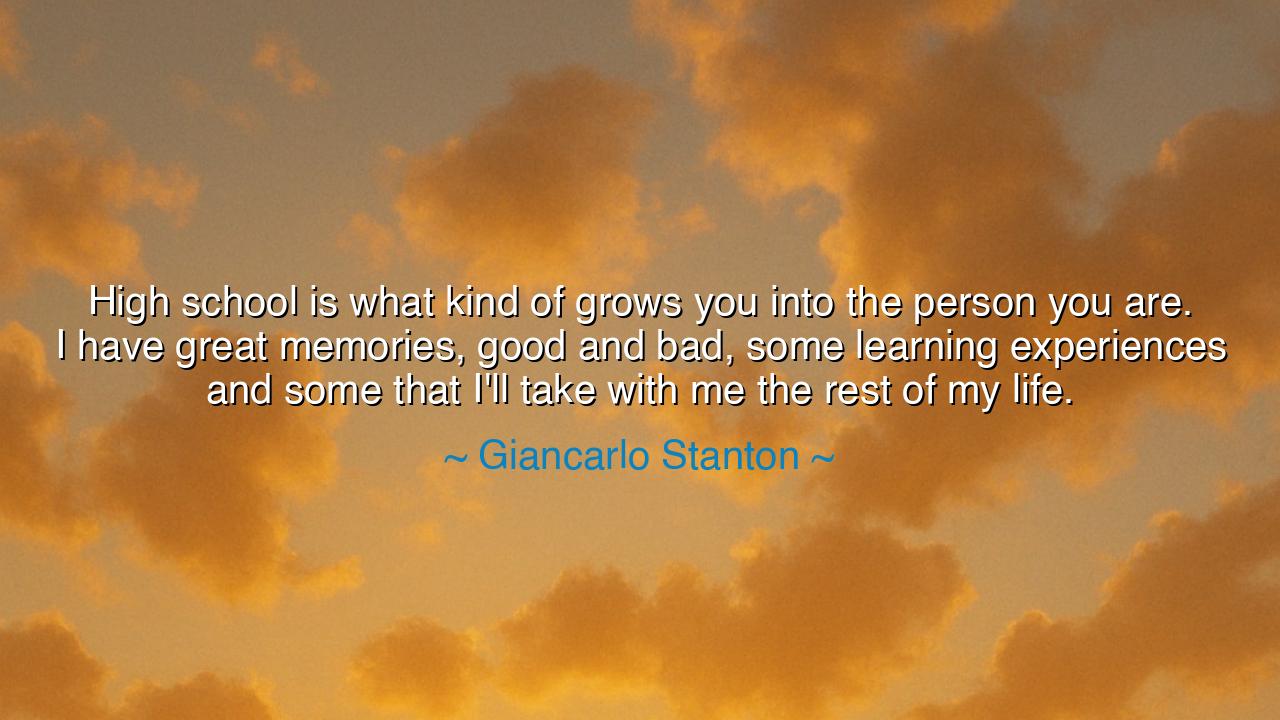
High school is what kind of grows you into the person you are. I
High school is what kind of grows you into the person you are. I have great memories, good and bad, some learning experiences and some that I'll take with me the rest of my life.






There are moments in every life that act as the forge where identity is shaped, and among them, the years of youth stand out like the dawn that determines the color of the coming day. Giancarlo Stanton, the modern athlete whose strength and discipline have made him a symbol of perseverance, once said: “High school is what kind of grows you into the person you are. I have great memories, good and bad, some learning experiences and some that I’ll take with me the rest of my life.” In these simple yet profound words lies an ancient truth: that the early seasons of one’s life are not mere preparation, but transformation — a sacred initiation into the art of becoming.
The meaning of Stanton’s reflection reaches beyond the halls of education; it speaks of the way experience, especially in youth, sculpts the soul. High school — or any formative season — is not just a place of lessons and teachers, but a mirror of life itself. It is where the heart first learns to dream and to struggle, to love and to lose, to fail and to rise again. The good and bad memories, as Stanton says, both hold value, for growth is born not only from success but also from sorrow. The trials of youth are the chisels that carve strength into the character of a man or woman.
The origin of this wisdom can be traced through the ages. The ancients knew that learning was not confined to knowledge, but to experience. The philosopher Plato taught that education is not the filling of a vessel, but the turning of the soul toward light. In the same way, the youth’s journey through school is not about memorizing facts, but about awakening — discovering one’s values, passions, and the endurance required to live with purpose. What Stanton expresses in modern speech, the sages of old would call the passage from innocence to awareness, from raw potential to the first shaping of destiny.
In every generation, there are those who carry their youth’s lessons like sacred relics. Consider the story of Abraham Lincoln, who, though he had little formal schooling, treated every experience of his early life as a classroom. From hardship, he learned empathy; from labor, he learned patience; from failure, he learned humility. When he finally stood to lead a divided nation, it was not the books he read that gave him wisdom, but the life he had lived — his collection of “good and bad memories,” as Stanton would call them. Thus, even the humblest beginnings can prepare a person for greatness when approached with reflection and gratitude.
Stanton’s words also remind us of the dual nature of memory — how the joys and the pains of youth remain with us, shaping our choices long after the moment has passed. The laughter of friendship, the sting of rejection, the pride of achievement — all become silent teachers that accompany us through adulthood. The wise do not run from these memories, nor do they cling to them with regret; they learn from them. The athlete learns discipline from loss; the artist finds expression through heartache; the leader discovers humility through struggle. Every memory, rightly understood, becomes part of the foundation upon which the future self is built.
The heart of Stanton’s message lies in the balance between reflection and growth. To honor one’s youth is not to dwell in nostalgia, but to recognize the roots of one’s becoming. The experiences of high school — and of any formative season — are seeds. Some grow into virtues like perseverance, empathy, and courage; others wither if neglected. The task of maturity is to tend to those seeds, to weed out bitterness and fear, and to nurture wisdom and gratitude. For as the tree cannot deny the soil that nourished it, so the soul cannot deny the lessons that shaped its strength.
Let this teaching be heard by all who walk the path of learning and memory: cherish your beginnings, for they are the architects of your being. Embrace both the victories and the wounds of your youth, for each has something to teach. When you look back, do so not with shame or longing, but with reverence — for you were being forged. And when you move forward, carry those lessons with humility, knowing that every phase of life, like every chapter of learning, is preparing you for the next. As Giancarlo Stanton reminds us, growth never truly ends — we are always being shaped by what we have lived, and it is through this endless becoming that we approach the fullness of who we are meant to be.






AAdministratorAdministrator
Welcome, honored guests. Please leave a comment, we will respond soon